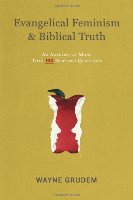About the Author
Wayne Grudem (PhD, University of Cambridge) is research professor of theology and biblical studies at Phoenix Seminary. He is the former president of the Evangelical Theological Society, a cofounder and past president of Council on Biblical Manhood and Womanhood, and has published over 20 books.
Overview
This book is designed to defend biblical complementarianism and respond to the claims of egalitarians. The heart of the book consists of a presentation of egalitarian objections to complementarianism and Grudem’s responses to them. It is designed so that it can be read in full or in part, where readers are able to find answers to particular objections, or study issues in which they are interested without needing to read the entire work. The egalitarian arguments are numbered, and then Grudem’s responses are placed in correspondingly numbered sub-points. The overall argument of the book is that egalitarianism fails to substantiate its position, and egalitarian objections to complementarianism fail to be persuasive on the scholarly level.
The book contains a number of appendices which substantiate and buttress Grudem’s position as articulated in the body of the work. The appendices provide detailed scholarship and delve into technical issues that could not be discussed in detail in the more general responses. There are word studies and book reviews in the appendices that show the deeper foundation on which the general responses were based. Both the main body of the work and the appendices consistently argue that a sound hermeneutic, attention to exegetical detail, accurate linguistic study, and rigorous theological reflection yield the conclusion that God designed men and women to be absolutely equal in terms of personhood, value, and salvation, but he has designed them to play complementary roles in the church and family.
Table of Contents
Chapter 1
A Biblical Vision of Manhood and Womanhood as Created by God
Chapter 2
A Biblical Vision of Manhood and Womanhood in the Church
Chapter 3
Evangelical Feminist Claims from Genesis 1-3
Chapter 4
Evangelical Feminist Claims from the Rest of the Old Testament
Chapter 5
Evangelical Feminist Claims from the Gospels and Acts
Chapter 6
Evangelical Feminist Claims About Marriage from the New Testament Epistles
Chapter 7
Evangelical Feminist Claims About the Church from the New Testament Epistles
Chapter 8
Evangelical Feminist Claims About the Church from 1 Timothy 2
Chapter 9
Evangelical Feminist Claims About How to Interpret and Apply the Bible
Chapter 10
Evangelical Feminist Claims from Theology and from Ideas of Fairness and Justice
Chapter 11
Evangelical Feminist Claims from History and Experience
Chapter 12
Evangelical Feminist Claims That the Complementarian View is Harmful
Chapter 13
Is Evangelical Feminism the New Path to Liberalism? Some Disturbing Warning Signs
Chapter 14
The Current State of Evangelicalism Regarding Biblical Manhood and Womanhood
Appendices
1 Danvers Statement (Council on Biblical Manhood and Womanhood)
2 “How Egalitarian Tactics Swayed Evangelicals in the Church of England” by Wallace Benn (CBMW News 2:3, June 1997, 14)
3 Over Fifty Examples of Kephalē (“Head”) Meaning “Authority Over/Ruler” in Ancient Literature
4 “The Meaning of κεϕαλή (“Head”): An Evaluation of New Evidence, Real and Alleged” by Wayne Grudem (from Journal of the Evangelical Theological Society 44/1 (2001): 25-65)
5 “Should We Move Beyond the New Testament to a Better Ethic? An Analysis of William J. Webb, Slaves, Women and Homosexuals: Exploring the Hermeneutics of Cultural Analysis” (Downers Grove: InterVarsity: 2001), by Wayne Grudem (from Journal of the Evangelical Theological Society 47/2 (2004, 299-346)
6 Three reviews of I Suffer Not a Woman by Richard and Catherine Kroeger (Grand Rapids: Baker, 1992), by S. M. Baugh, Albert Wolters, and Robert Yarbrough
7 Complete List of Eight-Two Examples of Authenteō (“to exercise authority”) in Ancient Greek Literature, by H. Scott Baldwin
8 Policy Statements of Selected Denominations and Parachurch Organizations Regarding Women in Ministry
Bibliography
Scripture Index
Name Index
Subject Index
Summary
Chapter 1
A Biblical Vision of Manhood and Womanhood as Created by God
This chapter presents a positive sketch of the complementarian position. God has created men and women equally in his image. They have the same worth but are designed to function in complementary ways. Even before the fall into sin God designed men and women to fulfill different roles in the marriage relationship. This arrangement is not a result of sin: it is part of God’s created order that was very good. Theologically we know that equality of personhood is not inconsistent with difference in function, because this is the way the triune God operates. The Father, Son, and Holy Spirit share the same essence and attributes, yet they have different roles. God is supremely good, so this arrangement cannot be negative. When it comes to human beings, then, equality in nature and difference in function cannot …
[To continue reading this summary, please see below....]
The remainder of this article is premium content. Become a member to continue reading.
Already have an account? Sign In
